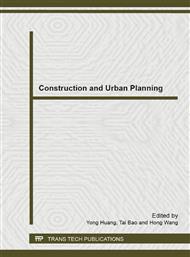p.2406
p.2410
p.2414
p.2420
p.2424
p.2431
p.2437
p.2441
p.2446
Evolution of Power - Development of Urban Space in Huanggang
Abstract:
Based on the generalized theory of urban space, according to the urban Research method of the Trinity of history-space-society proposed by Henri Lefebvre, this article incorporates the research of urban space evolution of Huanggang city, which is a typical city of Central China into historical frame and make research of cognition of urban space and space productivity and significance of power network based on from the perspective of diversified historical synchronic segments. Through historical diachronic observation and comparison, the transactional and interactive relationship between evaluation results of historical original features of urban space and power network is concluded so as to reflect the deficiency of urban planning system and draw multitudinous inspirations from history.
Info:
Periodical:
Pages:
2424-2430
Citation:
Online since:
March 2013
Authors:
Keywords:
Price:
Сopyright:
© 2013 Trans Tech Publications Ltd. All Rights Reserved
Share:
Citation:


